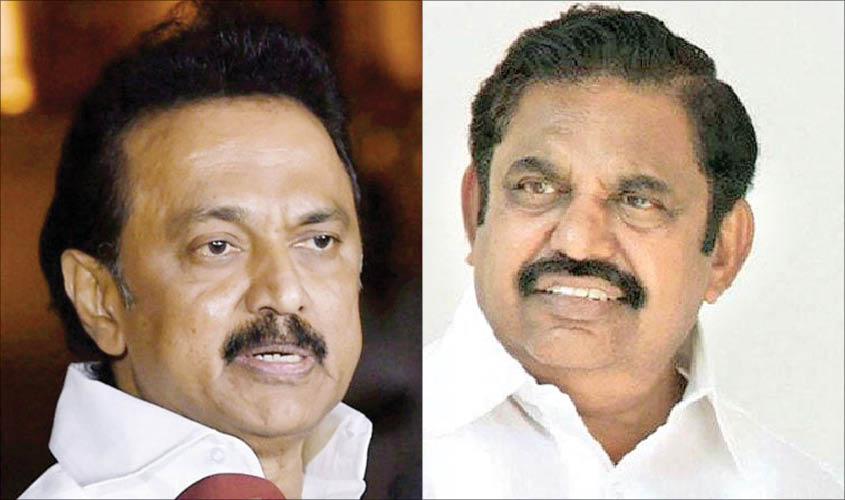Tamil Nadu for the first time went to polls without M. Karunanidhi and J. Jayalalithaa in almost five decades.
When Tamil Nadu voted on 18 April, it was the first time the state went to polls without Dravidian patriarch M. Karunanidhi and the charismatic J. Jayalalithaa in almost five decades. While both Karunanidhi’s DMK under the leadership of son M.K. Stalin and Jayalalithaa’s AIADMK are finding it difficult to fill the void left by the departure of their towering leaders, it will be no exaggeration to say that this election is a do-or-die battle for both the Dravidian parties, more so in the case of ruling AIADMK, which has pitched an alliance with the BJP, supposedly not to the liking of its supporters. The voting was not only for the 39 Lok Sabha seats, but also for the 18 out of the 22 Assembly byelections, crucial for the very survival of the AIADMK government led by Chief Minister E. Palaniswamy. The two major Dravidian parties have national parties as allies this time. The AIADMK has got BJP, DMDK, PMK, Pudiya Tamizhagam and the New Justice Party with it. The DMK has a seven-party coalition that includes the Congress, CPM, CPI, IJK, VCK and Vaiko’s MDMK. In fact, right through the campaigning the focus of both the coalitions was on the Assembly seats. The late Jayalalithaa won 21 of those 22 Assembly seats in 2016 in the 234-member House, which is now reduced to 213. To continue in power, the ruling AIADMK needs at least eight more seats. The party has now 114 legislators with it, but three of its MLAs are backing T.T.V. Dinakaran, nephew of jailed Jayalalithaa associate V.K. Sasikala, who has floated a new party, Amma Makkal Munnetra Kazhagam. Dinakaran, who won as an independent last year from Jayalalithaa’s RK Nagar constituency in Chennai, may turn out to be the nemesis of present day inheritors of Ammas’s party, not her legacy as Dinakaran would like to point out, Chief Minister E. Palaniswamy (EPS) and his one-time rival but now deputy, O. Panneerselvam (OPS). Whichever way, the 39 Lok Sabha seats from Tamil Nadu and the one from Puducherry, where the Tamil parties hold sway, may turn out to be the game changer in the final arithmetic of who comes to rule from Delhi. Many in the state feel that had Jayalalithaa been alive, she would have been the frontrunner for the throne in Delhi. Prime Minister Narendra Modi started campaigning in Tamil Nadu much before elections were announced. He made six forays into the state addressing meetings at Madurai, Tiruppur, Kanyakumari, Chennai, Coimbatore, Theni and Ramanathapuram. Congress president Rahul Gandhi began his campaign in the state with an interaction with the students of Stella Maris Women’s College in the heart of Chennai. He too went on to address joint rallies at Nagercoil, Krishnagiri, Salem, Madurai and Theni. While Chief Minister E.P.S. and his deputy O.P.S. campaigned for the return of Narendra Modi—“Modi Again”—Stalin rooted for Rahul Gandhi as the next Prime Minister of the country. AIADMK is banking on the BJP promise on setting up a commission to study interlinking of rives, sharing of river waters being the most contentious issue with all its neighbours. In fact the party was trying to give much importance to the support offered to the promise by Rajinikanth, the reluctant “Celluloid Messiah”. The actor had apparently said if the rivers are linked then the people would be happy as poverty in the country would vanish and farmers’ livelihood would be ensured. However the euphoria was short-lived when Rajini clarified that there was no change in his stand of not supporting any political party in the Lok Sabha and Assembly byelections in Tamil Nadu. DMK, on the other hand, hopes that the Congress promise to build cheap homes for the homeless would bring the alliance rich dividends at the hustings.
Most of the constituencies witnessed a direct fight between the DMK and AIADMK, but many places may turn crucial due to the presence of film star Kamal Haasan’s Makkal Needhi Maiam and TTV Dinakaran’s Amma Makkal Munnetra Kazhagam. While AMMK is sure to cut into AIADMK votes, MNM could harm both fronts. Critics point to the sparse crowds at Haasan’s public meetings, but his votes could turn the table either way. Anyway, Haasan has made it clear that he is “in for a long haul”, and his aim is the next Assembly elections in 2021. “The rest of my life is dedicated to politics. This (LS polls) is the foundation for Assembly polls,” Haasan told an interviewer the other day. Since the general mood in Tamil Nadu is in for a change, it will not be a surprise if MNM crosses 10% votes in many places. Dinakaran’s aim is to throw out the present leadership of the AIADMK and capture the party. He is in no mood to accept the party’s alliance with the BJP. “She (Jayalalithaa) had a clear stand that she will not join hands with Narendra Modi’s BJP or communal parties like PMK and even Vijayakanth’s DMDK. That is why she fought elections alone. But after her death, these leaders (of AIADMK) joined hands with the enemies of Amma,” Dinakaran was quoted as saying. The battle is open, though most of the poll surveys give a thumping victory for the DMK. Political observers point out that this may not be an endorsement of the political leadership of M.K. Stalin. It is more likely the anti AIADMK-BJP sentiment running across the state that will make a DMK surge possible. Stalin is hoping to cash in on it when he says that “even in a hung Parliament, we will thwart all efforts of BJP to form the government. We will form a secular government.” 23 May, the day of counting, is not so long.

